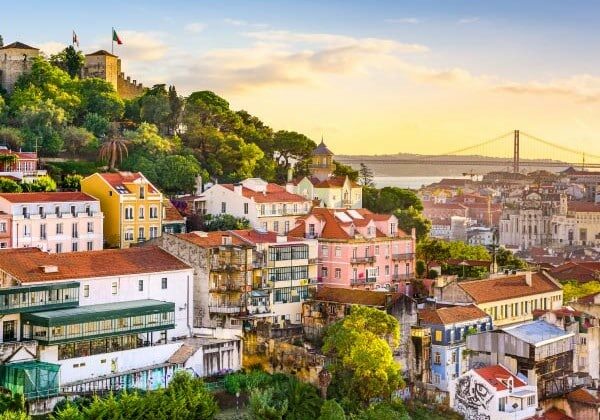Investors who want to secure a Portugal Golden Visa can take several routes, such as donating to the arts or reconstructing national cultural heritage. One of the most popular options involved real estate in the country. However, Portugal’s Golden Visa has undergone several changes over the last few months, with the most significant update removing the real estate option.
In this article, we’ll examine the Portugal Golden Visa changes 2025, why the real estate route was removed, which options are still available for investors, and what the implications are for current investors.
Latest Portugal Golden Visa News

The legislation came into effect in late 2023, and the most significant development is that real estate will no longer be available as a Golden Visa investment option.
Simply put, it is no longer possible to apply for a Portuguese Golden Visa through real estate investment. The removal of property as an investment option started gaining traction in mid-2023.
Contrary to speculation that the Golden Visa program was ending or suspended, the Portuguese parliament simply voted to restructure the program.
In addition to this, the capital transfer option is also no longer an eligible investment route. However, other investment routes remain available for those interested in Portugal’s Golden Visa program.
Portugal's Golden Visa Changes in 2023
António Costa, the Portuguese Prime Minister, stated in mid-2023 that the government would change the Golden Visa program. A few months later, the Mais Habitaçāo bill came into effect, introducing a range of solutions to tackle Portugal’s housing crisis, including eliminating real estate as an investment option.
Available Golden Visa investment routes
Portugal’s Golden Visa Program continues to exist, and the available investment options are:
- Venture Capital Fund Investment: Capital transfers of €500,000 or more for participation units in venture capital funds. Remember that investment funds with direct or indirect real estate investments are no longer an option.
- Investment or donation in the arts or reconstruction of national cultural heritage with a donation of at least €250,000.
- Scientific Research: Science or Technology research contribution of at least €500,000.
- Creation of ten jobs: Creation and maintenance of ten jobs during the required period.
- Share capital and job creation: Incorporation of a company or reinforcement of a company’s share capital, in either case with an investment of €500,000, combined with the creation of five or maintaining ten jobs (5 of them permanent).
The minimum investment amounts for options 2 and 3 may be reduced by 20 percent when the investment activity is carried out in low-density territories, otherwise known as areas with fewer than 100 inhabitants per square kilometer or a GDP per capita of under 75 percent of the national average.
The key implications of this legislation are:
- All pending applications will be evaluated according to the laws in place at the time of their submission
- The minimum stay requirement for maintaining residence permits will remain at an average of seven days per year
- Renewals of residence permits will follow the same initial rules as before
- Family reunions are guaranteed under the same terms as main applications
- Investment routes related to real estate and capital transfer are no longer considered qualifying investments
- The law took effect the day after its official publication
Portugal Golden Visa timeline 2023
Portugal's Golden Visa Changes in 2022

Most notably, in change in 2022 restricted the ‘qualifying’ areas for real estate investment within Portugal and made several investment options more expensive.
At the time, the government explained that these changes were necessary to spread foreign investment evenly to other parts of Portugal. With the Lisbon and Porto real estate markets thriving, the government focused on developing the property market in Portugal’s interior areas.
The following changes came into place on 1 January 2022:
Portugal Golden Visa real estate changes in 2022
- Investors cannot invest in residential property in popular urban areas such as Lisbon, Porto, and much of the Algarve, as well as coastal towns like Setúbal and the Silver Coast.
- Applicants can no longer get residential property in major cities such as Lisbon or Porto or in coastal towns of the mainland. Now, you can only buy residential property in designated interior areas of Portugal worth at least €500,000 or €350,000 if investing in a rehabilitation project. If the residential property is located in a designated ‘low-density’ area, then a 20 percent discount applies.
- Investors can purchase commercial property anywhere in the country worth at least €500,000 or €350,000 if investing in a commercial rehabilitation project. If the commercial property is located in a designated ‘low-density’ area, then a 20 percent discount applies.
- Investors can buy residential and commercial property anywhere in Portugal’s autonomous islands of Madeira and Azores, worth at least €500,000 or €350,000 if investing in a rehabilitation project.
Capital transfers changes in 2022
- The capital transfer amount requirement increased from €1 million to €1.5 million.
- The Investment fund minimum subscription requirement increased from €350,000 to €500,000.
- Investment in scientific research increased from €350,000 to €500,000
- Investment into an existing Portugal-registered business increased from €350,000 to €500,000
- An investment into the arts and cultural heritage worth €250,000 stayed the same.
Implications of 2022's changes to the Portugal Golden Visa

From 1 January 2022, investors could not buy residential properties in popular urban areas of the country like Lisbon, Porto, and much of the Algarve, as well as in coastal towns like Setúbal and the Silver Coast. Only residential property investments in interior parts of the country qualify (there are no location restrictions on commercial real estate).
In the wake of the changes, alternative investment routes to Portuguese residency have become more popular, namely the investment fund option.
Impact of 2022’s Golden Visa changes on existing investments
If you were in the process of purchasing a property in a thriving urban area, you would not have been impacted by the Portugal Golden Visa updates. However, from 1 January 2022, if you had been interested in purchasing a property in Lisbon, Porto, or parts of the Algarve, you could not buy property and apply for the Golden Visa program.
Following the end of the real estate route, the Portugal investment fund Golden Visa is a very attractive investment route.
Portugal Golden Visa 2024: what to expect?
New Social Investor Visa Portugal
The recently elected Portuguese Prime Minister, Luis Montenegro, announced an Action Plan for Migration on June 3, 2024, which is set to transform Portugal’s immigration framework.
A notable change involves the Portugal Golden Visa introducing the New Residence Permit for Solidarity Investment, also known as the Social Golden Visa. This initiative aims to channel private capital into social investment for immigrant integration projects.
This includes investments in reception infrastructure, integration projects, and support for vulnerable immigrants.
The Government views this residence-by-investment program as a tool for the Migration Plan and the “Build Portugal” Plan, suggesting a new Golden Visa option through investment in affordable housing projects.
While specifics and timings of this new Golden Visa option are speculative, it seems promising yet potentially challenging in terms of implementation and attracting significant investment, similar to the current Golden Visa cultural investment option.
Portugal Digitalizes Golden Visa Applications
The Portuguese government has also announced that Golden Visa applications will now be digitalized. All documents are to be submitted digitally, including the issuance of the Portuguese individual tax number (NIF). The change will help reduce bureaucracy and create a faster Golden Visa application process.
Portugal Golden Visa: A Brief History
Launched in 2012, the Portugal Golden Visa scheme is one of the most popular residency-by-investment schemes in Europe. The scheme allows investors and their families to obtain residency permits in exchange for a qualifying investment.
Since its launch, the Portugal Golden Visa has been a true success, with 11,384 investors and 18,617 family members benefiting from the Golden Visa program.
Portugal Golden Visa statistics show that, in terms of top residency-by-investment programs, Portugal is recognized as offering the best program in the world. There are multiple reasons for the program’s success. Portugal is one of the best European countries for expats due to its outstanding quality of life, excellent weather, and freedom.
While purchasing real estate properties is no longer eligible for the scheme, the Golden Visa program still offers several attractive investment routes suiting various investment goals. Some of the attractive Golden Visa investment routes that remain include investing in venture capital, research, or an existing business.
Golden Visa Delays Causing Applicants to Take AIMA to Court

Once AIMA analyzes the Golden Visa application and receives the go-ahead, the agency indicates the dates available to schedule the appointment.
This process should take about three months, but because of the agency’s slow pace of processing residency and immigration paperwork, thousands of complaints have been filed against AIMA. As many as 50 complaints per day have made their way through the legal system, and recent estimates peg the total number of complaints to around 8,000.
A large percentage of the legal actions are aimed at compelling AIMA to provide definitive decisions on individual Golden Visa applications.
These legal measures have been successful in many cases, benefiting not only applicants awaiting final decisions but also those still seeking pre-approval.
It’s important to note that while courts cannot directly decide on Portugal Golden Visa applications, they can require AIMA to issue decisions within specified deadlines. If AIMA fails to comply, its directors could be held accountable, as higher courts have already ruled.
These lawsuits are proving to be an effective tool for addressing the ongoing delays as legal action has often accelerated timelines by pressuring AIMA to prioritize responses.
However, even with legal intervention, further bottlenecks could arise during subsequent stages, such as biometric data collection. The hope is that at that point, a more streamlined system will be in place, although the potential need for additional legal measures cannot be entirely ruled out.
Why choose Global Citizen Solutions for your Immigration Visa?
GLOBAL APPROACH BY LOCAL EXPERTS
- GCS has offices located across Portugal.
- Members of the US-Portugal and UK-Portugal Chambers of Commerce in Portugal, and the Investment Migration Council (IMC).
- Our expert team can help you throughout your journey to secure your Visa.
100% APPROVAL RATE
- Our successful track record in applications provides reassurance to applicants.
- We have helped clients from more than 35 countries secure residency in Portugal.
ALL-ENCOMPASSING SOLUTION
- With a single channel of communication, our approach ensures that you have complete clarity on your application.
- Our BeGlobal® Onboarding System allows for a total flow of information.
TRANSPARENCY AND PRIVACY
- Our pricing is clear and detailed, you will not face any hidden costs.
- All data is stored within a GDPR-compliant database on a secure SSL-encrypted server.

Frequently Asked Questions About Portugal Golden Visa
Is the Portugal Golden Visa still available?
Yes, the Golden Visa is still available. However, since the Mais Habitaçāo bill came into effect, the estate and capital transfer options are no longer eligible investment options.
How is the Portugal Golden Visa changing?
Certain qualifying investments, including real estate investments, are no longer available.
Instead, interested parties can follow routes into other qualifying investments, such as investment into scientific research and artistic production, job production, and investment in companies.
Can you still get a Golden Visa in Portugal?
Yes, you can still get a Golden Visa in Portugal. However, new legislation has been introduced, meaning that real estate investments are no longer eligible.
What are the 2022 changes to the Portugal Golden Visa?
The biggest changes in the Golden Visa are related to real estate and capital transfer investment options.
Since the Mais Habitaçāo (More Housing) bill came into effect, the real estate and capital transfer options are no longer eligible investment options.
What do the Portugal Golden Visa new rules mean for my investment options?
The only notable changes made to the Golden Visa program in 2023 were the removal of property investment and capital transfer options. The Portuguese government also recently announced that the duration of the application period for the Golden Visa (6-18 months), will now count toward the five-year residency period to qualify for Portuguese citizenship.
Will the Portugal Golden Visa program be canceled?
No. The Golden Visa is still available. New legislation has passed meaning that real estate and capital transfer investments are no longer eligible for the Golden Visa.
Does Portugal's Golden Visa lead to citizenship?
While the Portuguese Golden Visa program is a residency-by-investment scheme, it is possible to secure Portuguese citizenship and permanent residency. You must hold your investment for five years and apply for permanent residency and Portuguese citizenship.
What are the Portugal Golden Visa real estate changes?
Certain investment types, such as real estate acquisition, will no longer be eligible to apply for the Portuguese Golden Visa. Other types, such as fund investments, will continue to exist.




